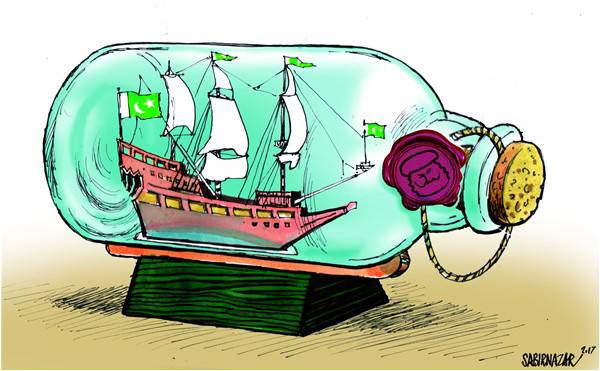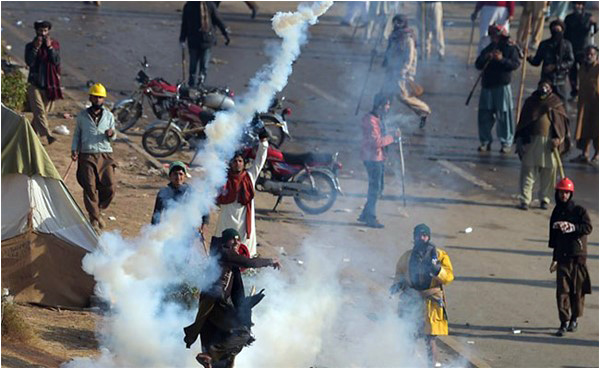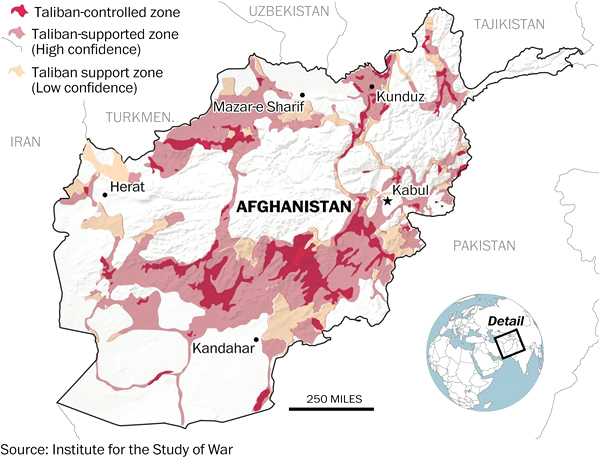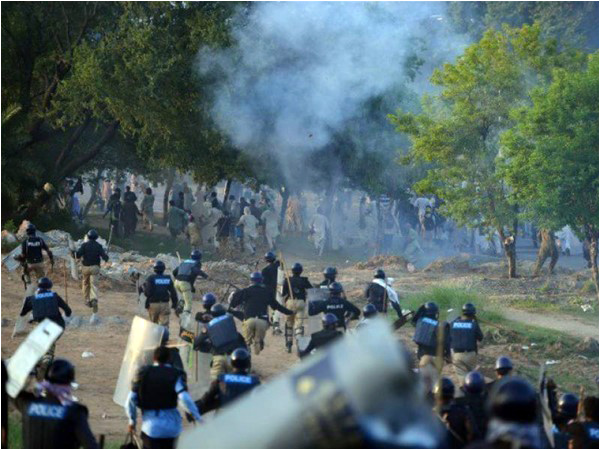
#FaizabadDharna
Sir,
Why did the government delay acting against the Faizabad protesters? Why did it allow them to occupy a busy intersection for almost twenty days?
It all started in the first week of November. A group of supporters belonging to the Tehreek Labaik Ya Rasool Allah (TLY) occupied the Faizabad interchange – a strategic location linking Islamabad with Rawalpindi. In the next two weeks, thanks to the government’s inaction and TLY’s adventurous, but carefully calculated strategy, this has become a national crisis today. On November 25, the government decided to employ force to disperse the group.
Unfortunately, the government had to withdraw the police the same day, as the operation failed. On November 25, the government called the Army to support the civilian administration to clear the protesters.
The protesters primarily belong to TLY and a few other Sunni groups. The TLY became popular during the last two years, with their support for the Blasphemy law. They catapulted onto the political scene with their support for Mumtaz Qadri. The TLY used the Qadri trial and his hanging as a political slogan.
Khadim Hussain Rizvi is a Barelvi cleric. Known for his fiery sermons, Rizvi has been exploiting Qadri’s hanging and calling for strict adherence to the blasphemy law.
Is there a broader endgame for the Islamabad protest? The protester’s immediate demand has been met. The TLY’s initial demand was to restore the original clause and sentence of the Khatm-i-Nabuwat declaration in the Election Act 2017.
In October 2017, the Election Bill passed by the National Assembly had a minor change: it replaced the phrase “I solemnly swear” with “I believe” in a paragraph relating to belief in the finality of prophethood. Subsequently, the government called it a “clerical error” and restored the original wording.
The demands, their occupation of Faizabad and ongoing protests, perhaps have a more substantial endgame, aimed at the elections. The TLY has already lunged into politics; its supporters contested two National Assembly by-elections in Lahore and Peshawar. Though they lost both, their performance has been the talk of the nation. In Lahore, Labaik (independent) candidates have polled more than that of the PPP’s, and in Peshawar more than that of the JI’s.

The TLY is using the protest as a political strategy to get support in Punjab, and other provinces. The challenge in Punjab for the TLY is the PML-N, which is in a crisis of its own, thanks to the Panama Papers and verdict disqualifying Nawaz.
Why did the protesters not choose Lahore or Karachi? Faizabad interchange connects Islamabad and Rawalpindi. Murree Road and the Islamabad Expressway run through the interchange. These are not just two arteries; they are a lifeline for the twin cities. Officials, students, teachers, health workers, businesspeople and labourers use the exchange to move across. Blocking the capital meant publicity and access to national and international media. The fact that PEMRA blocked news feeds underlines this.
Why did the government delay action against the protestors? It’s the politics stupid. And the elections next year. The PML-N-led government (in Punjab), and the national government (in Islamabad) did not want to take any action against protesters from the beginning. Had it not been for judicial pressure, the government would have allowed the protesters to continue.
The government’s strategy was aimed at avoiding clashes and casualties, which the protesters wanted. Facing elections next year, the PML-N perhaps wanted to play it safe and do give its opponents any edge. It is widely believed that the “soft right wing” in Punjab votes for the PML-N. Perhaps, the government expected that public frustration would turn against the protesters.
In recent years, this has become a trend: protesters occupy central locations for longer periods, and the government tires them out. Imran Khan led protests using containers in Islamabad. Tahirul Qadri promised a revolution during Zardari’s regime, using the same tactics. The PPP government then, and the PML-N government later tried the same technique: sit tight, do nothing and exhaust them.
“Dialogue” and “negotiation” have become the strategies to deal with extremists. The political establishment, cutting across parties, wanted to negotiate with the Taliban. From Imran Khan (earning him the nickname Taliban Khan) to Nawaz Sharif, every party would have wanted to negotiate with militants. Had it not been for Army Public School in Peshawar in 2014 when 150 deaths occurred, parties would have still preferred to negotiate. Even now everyone in the government wanted to negotiate with Khadim Rizvi. Multiple deadlines were given.
Why did the operation fail on Nov 25? Eventually, the government deployed an 8,500 strong elite police force along with para-military to disperse the protesters on November 25. The force used tear gas, burnt the tents, and arrested a few hundred. By evening, the police retracted. The protesters were armed with sticks and stones. Why did the police retract? Perhaps, they were asked.
It appears to have been a failure of strategy, rather than the strength of the protestors. Perhaps, there was a plan to withdraw and request the military to step in. Any casualties would be the responsibility of the khakis and not the political leadership. There were protests in other parts of Pakistan. That could not be the reason for the withdrawal. TLY supporters occupied busy junctions in Karachi but the local government and police were effective.
Is the Establishment on the same page? The political circumstance and the Establishment’s role in “political engineering” have been the focus. Developments in Karachi (relating to the merger and the fallout between two Mohajir parties), the alleged role against Nawaz and the debate on the “PML-N minus Nawaz” formula given hints on a larger development behind the scenes.
The ISPR spokesperson commented on fulfilling any constitutional responsibility of the military. However, newspapers quoted Army Chief Gen Qamar Bajwa “advising” the PM to handle the situation “peacefully”. The Interior Ministry made a request on Nov 25, “to authorize deployment of sufficient number of troops of Pakistan Army to be determined by the Commander 111 Brigade, in aid of civil power, to control law and order situation in Islamabad Capital Territory with effect from November 25 till further orders.”
Now, the ball is in the Establishment’s court; what “peaceful” measures will it adapt to handle the situation?
Surely, [certain quarters] would have their own reach into the TLY leadership. They could persuade them to withdraw in the name of national interest. [There was also the face-saving option]: pressuring the PML-N to ask the law minister to resign and use it as leverage against the TLY. Or, the Establishment could ruthlessly bring down the protesters as Musharraf did with Lal Masjid. But for Musharraf to do so, there was pressure from Beijing. More likely, there will be another round of negotiations, this time led by the Establishment negotiators.
Who are the victors and losers? There are a few losers. The first is the PML-N. It would be seen as impotent by trying to postpone the inevitable. True, the civil society in Islamabad and Rawalpindi may be frustrated with the protesters; so would they be against the PML-N.
The second loser is the process of governance and the writ of the State. Whatever happens at the end, dilly-dallying by the government is likely to encourage more such protests. And look at the protest location; it is not taking place in the deserts of Balochistan or the tribal agencies of the FATA. If the State cannot protect its capital from a bunch of stone-wielding protestors, what does it talk about the political will? Zardari and Sharif have set a bad precedent.
The police force that was deployed to disperse the protesters. Every province should have an adequate special police force, with sufficient arms, training and experience to meet similar situations. Calling for the military to evict a group of protesters occupying a busy road should impinge on their morale as well. To be fair to them, had they been asked in the first few days, they could have cleared them. The political leaders should take the blame for letting the situation out of hand., and for not giving the right orders to evict at the right time.
The biggest loser would be that moderate section fighting against the misuse of blasphemy laws and radical groups. Now, the TLY and radical right groups will march on, bulldozing the voice of reason in Pakistan.
Whether there is a military operation next or not, the TLY is the victor. Khadim Rizvi could not have asked for more. Perhaps, a silent victor is the Deep State, especially for the section that wanted to checkmate the PML-N and has been working on political engineering.
The language that the interior ministry’s note asking for the military deployment is almost a surrender. It leaves the number of troops to be “determined by the Commander” from November 25 “till further orders.” Does this say something?
Suba Chandran,
Via email.
Talks with Taliban?
Sir,
The Taliban attacks on Afghan security forces in Kandahar and Farah intend to demoralize them as the Afghan forces have been beset with casualties and desertions since NATO combat forces pulled out in late 2014.
The insurgents stormed police and army bases and government facilities, demonstrating that security is deteriorating and the government is losing grip. The Taliban increased its territorial and population control this year, according to the Pentagon. They control a third of the country.
A military solution will not suffice. A peace process is almost certainly the best way to end the war as a negotiated settlement is more achievable than a military victory and more desirable than an endless military stalemate.
This conflict is affecting reconstruction and increasing the sufferings of Afghanis. It is making the country unstable, which is helping ISIS and other extremists increase their footprint.
The Taliban has condemned and countered ISIS in Afghanistan, which suggests that the group is not allied to the global jihadist outfits that pose the greatest threat to Western interests. It is comparatively easy to engage the Taliban in talks compared to jihadist outfits from the Middle East which have global aspirations.
One of the conditions for talks to succeed is the realization that both sides cannot win the war. Both parties (government and Taliban) are aware of this. The Taliban are feeling pressure from the growing body count and from defectors who have pledged allegiance to ISIS.

The government realizes that without the support of its foreign allies its forces can’t tackle the Taliban insurgency on their own. There should not be any conditions from any side to start the talks such as the disarming of insurgents or withdrawal of foreign forces. The process can even be launched with continued fighting. History has demonstrated that these kind of talks have been successful: during the American Revolution, the end of the Algerian revolt against the French, and civil wars in Namibia, El Salvador, and Angola—fighting continued during negotiations and sometimes spiked as one side tried to break the other’s will.
The Taliban still maintain an office in Doha and it has the authority to negotiate. It secured the release of five Taliban members from Guantanamo in 2014, in exchange for captive Sergeant Bowe Bergdahl. This office could be a starting point. Employing indirect communication lines could prove effective, including forging ceasefires at local levels, detainee releases and engaging intermediaries, such as tribal leaders, who maintain contacts with both sides. A political settlement could take years and there should be no rush to launch premature formal negotiations. This does not detract from the urgency of undertaking informal preparations. The government should work on grievances fueling the insurgency such as corruption, injustice, warlordism, and marginalization of tribal and ethnic groups.
Afghanistan functions as a land bridge connecting South Asia, Central Asia, Eurasia, and the Middle East. Peace and security here will be vital for broader economic cooperation in the region. So, wholehearted regional support should be given to any peace process. A third party can bring impartiality, patience, and balance to the negotiating table.
Manish Rai,
Columnist for Middle-East and Af-Pak region,
Editor of Viewsaround.

On merit
Sir,
A few lines for readers to consider on the Faizabad dharna: The Islamabad High Court rightly admitted the petition to provide relief and justice in view of the troubles people faced in Islamabad and Rawalpindi. The government’s claim of a typing mistake/error was not accepted due to the principles and procedure laid down in the constitution on making amendments. The court considered all facts on merit and issued a relief order with a directive to the ministry. The court’s prime responsibility was to issue an order on merit and the ministry’s responsibility was to respect and implement it with sincerity and in true spirit.
Khalid Mustafa,
Advocate,
Islamabad.

